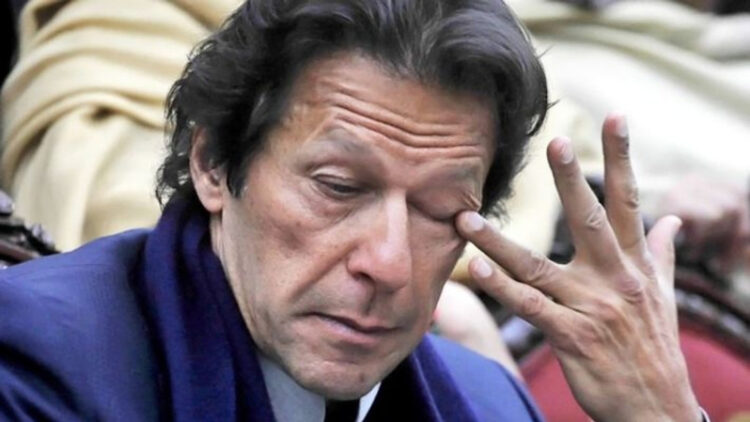New Delhi: The downfall of Imran Khan in Pakistan’s politics is a case in study. His mere slogan ‘Naya Pakistan’ was not enough to save him from his follies.
He failed to deliver in governance and also failed the same army that invested enough time, resources and planning to help his politics.
Imran Khan had risen to power by convincing the voters that he was the only clean politician in Pakistan and that everyone else was corrupt. Now in his exit, he harbours a feeling that everyone opposing him is not only corrupt but an American puppet and so a traitor.
A write up in ‘The Guardian’ sums up the story of his fall effectively. – “Any civilian prime minister interfering with the army or the way it wants to run the country’s defence policy is seen as the enemy. As soon as the army withdrew its support, opposition parties moved in for the kill.”
Shaista Tabassum, former head of the international relations department at the University of Karachi, has been quoted by ‘Time’ magazine as having stated that Imran and his ministers “have been publicly dragging the army into politics, saying things like the army is very much behind us or that we enjoy the support of the army chief.”
As the differences between him and the army over the appointment of a new ISI chief snowballed into a major row in 2021, Imran also “broke taboos” by mentioning a private discussion with the army chief at a public rally, countering the military’s own claims that it doesn’t interfere in politics.
Imran also believed in his ego power more than American power.
He was ill-advised to declare in August-September 2021 that the Taliban taking powers in Afghanistan, humiliating Joe Biden and his country, was actually a step that “broke the shackles of slavery”.
Americans – also an ego-fed and ego-centric nation could not stomach that. And why should they, after pumping so much money into the country?
And when the departure time came from the corridors of power, he gave up his cricket field’s gentleman’s game spirit. He declined to follow the rules and instead made himself look like Javed Miandad, who was unable to score runs against India and instead chose to lampoon Indian wicketkeeper Kiran More. And how power and his 2018 electoral victory changed the man.
Firstly, he neglected governance and old vices of ‘Purana Pakistan’ prevailed. The structural problems and economy were not attended to. Instead, he embarked on a moral crusade, and he did not only to be the leader of Pakistan but also the leader of the ummah (community of Muslims).
Not surprisingly, he decided to lecture foreign ministers of Muslim countries about how porn was responsible for rising divorce rates. He perhaps forgot that his own case rested on the ‘third marriage’.
During the fag end of his stint in office, he declined to step down gracefully.
“He behaved like a child who realises for the first time that other children have birthdays too. Because he (Imran) believed that if he wasn’t in charge of the house, he might as well burn it down,” says Karachi-based writer Mohammed Hanif, a reputed author of the novels, ‘A Case of Exploding Mangoes’ and ‘Red Birds’.
Imran played a unifying factor for Pakistan’s opposition camp without his knowledge. The new challenge for Shehbaz Sharif, Bilawal Bhutto Zardari and others was to play the game on an entirely new chessboard.
The army simply had moved to another room, leaving Imran alone. Indeed, the opposition parties soon recognised that the game was taking a more critical turn but would throw up new opportunities for them. They knew Imran’s downfall was imminent.
For Pakistan’s new Prime Minister, Shehbaz Sharif, the foremost challenge will be handling the economic crisis and keeping the political alliance intact.
Out of office Imran Khan and his PTI party have the license to be on the streets, and they have been masters at street campaigning.
The new foreign minister – Hina Rabbani Khar – now only with a junior Minister of State status-has a difficult task at hand to improve ties with the US.
The geopolitics of the past and good support from Washington earlier allowed authorities in Pakistan-both civil and army – to commit blunders like the 1965 misadventure, struggles in the east in 1971 or even Kargil intrusion in 1999.
Now there is a shrinking chessboard. This creates structural crises for Pakistan’s new regime not seen before.
There will not be enough room from the past for political and military manoeuvring. There is no room to insulate domestic crises and even buffer relations between military commanders and political leaders.
Pakistan’s new government finds itself in chaos and challenges in more ways than one. Nawaz Sharif had banked on improving relations with India, presuming that it could boost the economy and trade ties.
After Pulwama, India has decided to apply tougher rules to the game. The American support will be critical at the IMF, the Financial Action Task Force and diplomatic balancing.
The only advantage the new government will have is the military establishment’s support.




















Comments